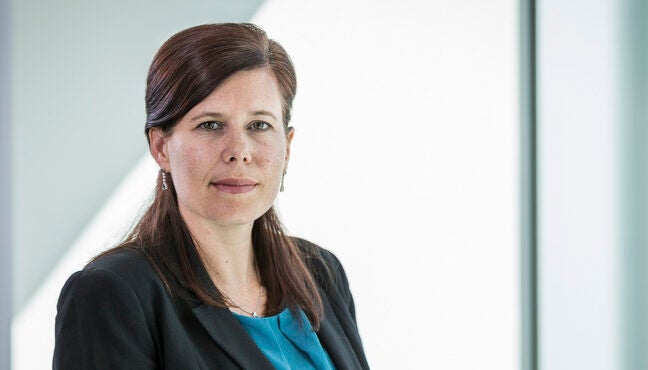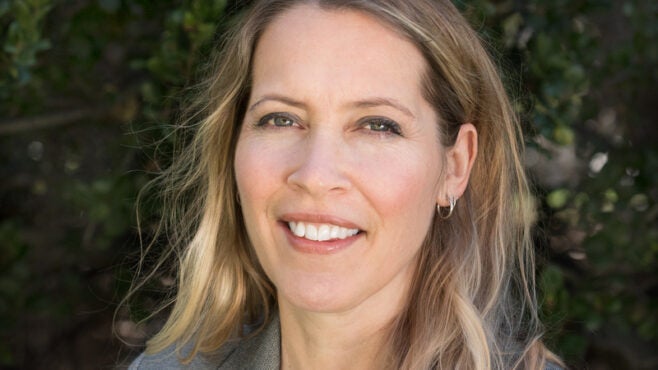

Natasha Lamb of Arjuna Capital says: “With Facebook, it’s like talking to a teenager: they’re not listening, and you’re not going to get the response you want.” (Photo courtesy of Arjuna Capital)
- Investors and activists flag major challenges in engaging with the tech giants Facebook, Google and Twitter to highlight concerns.
- Even a platform set up by 105 asset owners with $9.3trn of assets had limited success in influencing the trio and was disbanded last year.
- Asked whether they would consider divesting shares, investors said they preferred to engage.
Investing in the world’s largest technology companies has proved very profitable; however, engaging them over concerns related to social media has been less fruitful.
Despite frequent high-profile scandals engulfing the likes of Facebook parent company Meta, Google’s parent Alphabet, and Twitter, demand for their stock continues to soar (see chart below). Even the explosive testimony late last year of former Facebook employee Frances Haugen – contending that the company chooses profits over safety – appears to have had negligible overall financial impact.
Yet it is increasingly difficult for shareholders to ignore the evidence of these companies’ negative social impact, which has grown along with their influence: from the effects on the mental health of children and teenagers to their use as tools to facilitate terrorism and even direct attacks by US citizens on the Capitol in Washington, DC, the seat of the country’s Congress.
The issue of online child sexual abuse material alone would be enough to assert the need to change. In 2020, some 21.4 million such cases were reported in the US, a 28% increase from the previous year, and 94% of them involved Facebook, according to the country’s National Center for Missing and Exploited Children.
But a whiff of fatalism has drifted into the debate, with concerns rising that these corporations have become too powerful for even regulators to rein in. Facebook averaged 2.91 billion daily active users in the third quarter of last year, the number for Twitter was 211 million for the same period, and Google claims more than one billion active monthly users. Any major effort to break them up is now seen as unlikely.
So, can investors hold these companies to account and drive positive change? In theory, yes – but there is substantial evidence of intransigence and disdain shown by the tech giants towards shareholders.
Ultimately, just a few so-called ‘super-voting’ shareholders dominate control of Facebook and Google. And governance experts seem divided between filing shareholder proposals that are unlikely to pass and trying – mostly in vain, it seems – to engage with the companies.
Even a platform backed by 105 asset managers and owners representing NZ$13.5trn ($9.3trn) in assets under management struggled to make its influence felt.
The initiative – launched after the deadly March 2019 terrorist attacks in Christchurch, New Zealand – was led by the country’s sovereign investors, including New Zealand Superannuation Fund (NZ Super). Its aim was to pressure Alphabet, Meta and Twitter to strengthen controls to prevent the live-streaming and distribution of objectionable content.
Participants in the initiative included four of Sweden’s AP state retirement funds, various Australian, British and Canadian pension plans, and large fund houses such as Aberdeen Standard (now Abdrn) and Legal & General Investment Management.
“One of the reasons we chose to build a global collaboration was to involve large shareholders so the companies would listen to us,” Katie Beith, at the time the engagement lead at NZ Super, told Capital Monitor in November. She has since joined wealth management company Forsyth Barr.
"Source of frustration"
“It was a source of frustration that, despite having over 100 investment organisations alongside us speaking with the same, unified voice, we were still unable to speak directly to the board, and it was one of the reasons we escalated to a public release of the campaign,” Beith added.
The initiative tried different tactics: engaging via the entire platform, a subset of the platform, and solely via NZ Super.

Katie Beith, former ESG engagement lead at NZ Super, says it was frustrating that the investor group was unable to speak directly to the tech companies' boards. (Photo courtesy of NZ Super)
“There were some other levers we [also] considered, such as a vote against a director campaign or a shareholder resolution. But we decided not to use those forms of escalation because of the voting structure at the companies,” says Beith.
Ultimately, she adds, “we did feel that our message was heard by the board[s], particularly in the case of Facebook”.
“Progress was made, and we had been planning to wind the engagement down because we saw that changes were made to the platforms and that these were working for the specific focus of our engagement: to strengthen controls around the live-streaming and dissemination of objectionable content.”
The group said that, as a direct result of its engagement, Facebook strengthened its audit and risk oversight committee charter to include explicitly a focus on the sharing of content that violates its policies. It included a commitment not just to monitor and mitigate such abuse, but also to prevent it.
Despite this success, it is clear the initiative failed to make the dent its signatories had hoped for. In late October 2021, the group ended its engagement, announcing in NZ Super’s annual report that: “None of the companies agreed to our request for a board member to meet… With such a large group of influential investors behind this agenda, we felt there was insufficient commitment from the companies to hearing and addressing our concerns.”
Asked whether it would consider divesting the tech giants' stocks, a NZ Super spokesman said it preferred to engage with companies to encourage them to improve their policies and practices.
"Exclusion is a last resort that we may choose to undertake if we believe engagement won’t be effective," he told Capital Monitor by email. "We remain an active shareholder on responsible investment issues and will continue to advocate for improvements in the practices of social media companies."
In fact, it has increased its already substantial holdings in all three companies between 19 October last year and 18 January this year: in Alphabet, from 212,587 to 222,109 shares worth NZ$892.9m as of 18 January; in Meta, from 817,440 to 847,904 shares worth NZ$398.3m; and for Twitter, from 204,865 to 216,147 shares worth NZ$11.9m.
The threat of divestment
The group's experience highlights the huge dilemma facing investors today. If engagement fails to land a blow, what next? Capital Monitor asked other asset managers and owners in the coalition how successful engagement had been with the 'big three' and whether they would consider divesting.
Tessa Younger, a spokeswoman for the UK’s Local Authority Pension Fund Forum (LAPFF), which represents schemes holding around £300bn ($398bn) of assets, indicates this was not a path to take lightly. “Divestment can be a blunt tool that deprives investors of leverage to influence companies,” she says, adding LAPFF’s member funds will divest if doing so aligns with their investment strategy.
Neither Facebook nor Alphabet indicated any interest in engaging with us. Facebook, in particular, is notorious for its unwillingness to engage with shareholders. Sara Murphy, The Shareholder Commons
Asked whether progress had been made against Facebook, Google and Twitter, the LAPFF cites a report by consultancy Brainbox Institute, commissioned by the coalition. It concluded that actions taken by the platforms “are likely to be highly effective in mitigating the scale in which objectionable content can be disseminated online in future”, but not fully effective. The report also examined regulatory changes that might help.
In general, the coalition says it expects further progress to be made and that while this particular engagement has ended, more is to come.
Indeed, Sweden’s AP Funds Council on Ethics – which advises the country’s AP state pension funds – started a project focused on human rights in the tech sector last year, says Peter Lundkvist, chairman of the council. It has identified what it feels are reasonable human rights expectations of companies such as Alphabet, Facebook and Twitter and has summarised them in a document called 'Human Rights Expectations for Tech Giants'.
Unusually, though, the AP funds have a policy that they will divest after four years if engagement is not showing progress. “In 2020, we started a project concerning human rights issues in the tech sector,” says Lundkvist. “This project is still ongoing and it is still too early to draw any strong conclusions.”
Open to discussion?
On the face of it, engagement with the social media giants is possible. As they should, all three report that they engage with shareholders – offering up plenty of publicly available commentary on how important it is to them and how best to do it.
Facebook spokesman Ryan Moore tells Capital Monitor: “We value the views of our investors and regularly engage with them to get their perspective, which includes seeking input during the annual shareholder proposal process.”
Neither Google nor Twitter responded to requests for specific comment.
Of course, making such statements is easy; whether these companies walk their talk is another matter. From what we gathered, many investors find them wanting.
Activist shareholder James McRitchie was forthright in his criticism. Alongside US non-profit organisation Shareholder Commons, McRitchie filed resolutions at Facebook and Google this year calling on them to become public benefit corporations (PBCs) – effectively stakeholder-focused organisations. Google unsuccessfully tried to exclude the PBC resolution, though it received only a small amount of support from shareholders.
In respect of Facebook, McRitchie tells Capital Monitor: “I’ve engaged since as far back as 2014… I haven’t seen much willingness to engage.”
Underlining McRitchie’s point, Facebook faced six shareholder resolutions at its May 2021 annual meeting, while Google had eight on its 2021 proxy statement – and both companies opposed every proposal. Only two shareholder proposals were voted on at Twitter’s annual meeting in June last year, and the board asked shareholders to vote against both.
Facebook enabled [former US president Donald] Trump. They have gobbled up competitors and have a stranglehold on the minds of millions. We have to continue to engage on all fronts. James McRitchie, Activist shareholder
McRitchie likens Facebook to a "dictatorship" that is "very large and powerful": "They enabled [former US president Donald] Trump. They have gobbled up competitors and have a stranglehold on the minds of millions. We have to continue to engage on all fronts.”
He recalls that Facebook threw Lisa Lindsley, who was representing non-profit SumOfUs, out of its 2018 AGM for trying to ask a question on an item that was due to be voted on.
Lindsley confirmed to Capital Monitor that she stood up during the agenda item on the election of the board of directors to speak about why shareholders should not re-elect Mark Zuckerberg.
"The executive running the meeting wanted me to wait until the Q&A at the very end of the meeting after the votes had been cast, and I refused because my remarks were germane to that agenda item," she said via email. "Two security officers escorted me out of the annual meeting."
Sara Murphy, chief strategy officer of investor representative body The Shareholder Commons, cites similar experiences. “Neither Facebook nor Alphabet indicated any interest in engaging with us,” she tells Capital Monitor. “Facebook, in particular, is notorious for its unwillingness to engage with shareholders, and on the rare occasions when it does, [it shows] general disdain and recalcitrance.”
Social media firm voting structures
Some of this intransigence may be down to ownership structures, at least at Facebook and Google, where super-voting shares are predominant. Facebook CEO Mark Zuckerberg’s voting power and that of Larry Page and Sergey Brin at Google dwarf the influence of even the companies’ largest shareholders (see graph below).
Importantly, conversations with investors suggest there is a cultural difference in expectation between the US and the rest of the world. In the EU, UK and New Zealand, board members regularly meet with shareholders, but in the US – apart from the very largest investors – shareholders have access only to management.
Consequently, Natasha Lamb, managing partner at US asset manager Arjuna Capital, filed resolutions this year asking for a human rights expert to be elected to the board at all three companies. She found Google to be more responsive than the other two companies.
“Facebook is just controlled by [Zuckerberg], but at least at Google, where there is a team, there is flexibility and they take notes and agree to do things,” she tells Capital Monitor. “We’ve had some success [approaching Google]. They’re the elders in the room so they have more experience dealing with their shareholders.
“With Facebook it’s like talking to a teenager: they’re not listening, and you’re not going to get the response you want,” Lamb says. “Twitter I’d put in the kid bucket too, but I was quite surprised to hear from them this year – and encouraged.”
In a similar vein, Boston-based NorthStar Asset Management has filed ‘one share, one vote’ resolutions at Google and Facebook for several years but has failed to have a conversation with either company, CEO Julie Goodridge tells Capital Monitor.
The firm has focused on voting power for good reason, she says. “We had already tried filing on a whole range of issues with zero response from Google. So we thought the voting power is why we are getting zero response, so let’s cut to the chase and deal with the most important corporate governance issue.”
The companies in question have super-voting shares in place so they can retain control, Goodridge says. “And the board is voted in place by the controlling shareholders, so they are not going to engage either. There is no material risk to them for ignoring the public shareholders.”
Staying power
NorthStar holds around $90,000 of shares in Meta, $13.25m of Alphabet and $244,000 in Twitter. Asked whether it would divest if the companies continued to stall, Goodridge demurs.
“If you believe that a company is game-changing – and Facebook has been – and you see governance problems that consistently derail the company, all of which are easily corrected, we think majority shareholders… have a responsibility to engage in the corporate democracy,” she says.
After all, engagement does – sometimes – yield fruit.
“We filed a proposal with Twitter on net-zero benchmarks and subsequently they engaged with us,” says Danielle Fugere, president of activist organisation As You Sow. “They recognised they were lagging [behind] on climate strategy, though they wouldn’t discuss anything which hadn’t been disclosed publicly.”

Danielle Fugere, president of As You Sow, says Twitter engaged with the organisation after it filed a proposal on net-zero benchmarks. (Photo courtesy of As You Sow)
As You Sow ultimately withdrew the proposal, as Twitter committed to science-based targets and disclosing its emissions in 2021 for the first time. “We believe the proposal motivated the company to speak to us,” Fugere says.
However, while As You Sow has managed to engage with Facebook, that is more than can be said for many. As You Sow has filed resolutions at Facebook every year since 2018 and will file another for the 2022 annual meeting this week, says chief executive Andrew Behar. “We’ve had several meetings with them, but most of our co-proponents have not been able to get a meeting.”
Sex trafficking via social media?
Behar adds that Michael Passoff, CEO of Proxy Impact, another shareholder representative organisation, repeatedly tried to arrange a meeting with Facebook about his 2021 proposal on sex trafficking but without any success. “He asked a woman who had been sex-trafficked over Facebook to present the resolution at the annual meeting, which was quite powerful,” Behar says.
Passoff tells Capital Monitor that Facebook took more than a year to get back to his firm to schedule a meeting to discuss a shareholder proposal that the company address the amount of paedophilic material on its site.
Ultimately, shares worth 321bn supported the resolution based on the closing stock price on the day of the 2021 AGM, he adds. That represented 17.25% of the overall shareholder vote, and 56% of the non-management controlled vote, Passoff says.
“They [Facebook] just have a total disrespect for shareholders," he adds.
That being said, certain investors – albeit in the minority – were more sanguine about their experience with the three tech giants.
The head of proxy voting at a big US public pension fund says the trio had improved in respect of engagement over the past four to five years. However, the executive adds, his fund had not asked to meet with a board member so had not been refused. “Management’s a conduit to the board, anyway,” says the individual.
The divestment versus engagement dilemma is set to endure in respect of the tech sector, just as it is for the fossil fuel industry. A key difference, though, is that ultimately oil, gas and coal are waning industries, while technology companies seem likely only to grow stronger and more important – making ditching them a far harder call, regardless of how they behave.
No doubt responsible investors will continue to pursue Facebook, Google and Twitter. All three have an ethical responsibility to safeguard the public from exposure to dangerous and malicious content, despite their inability to acknowledge the full extent of their influence over it.
But while owners of a stock are not ultimately responsible for that company’s behaviour, their reticence to divest when all other avenues are exhausted or seem fruitless may well be a driver of the social media giants’ lack of urgency to evolve.






